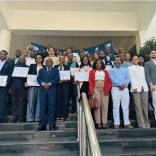FACIM: Mozambique's largest trade fair 90% ready for official opening next week
CTA seeks clarifications concerning Mozambique entry visas, DIREs

Photo: CTA
The Confederation of Business Associations of Mozambique (CTA) last week met the National Migration Services (SENAMI) to address, among other issues, the delays in granting visas, clarification on requirements for obtaining short-term and permanent residence visas in Mozambique, lack of harmonisation of the requirements for granting visas in different Mozambican embassies (each embassy has its own requirements), and difficulties in obtaining residence visas and DIREs in the province of Sofala.
At the meeting, the CTA presented the concern of businesspeople around the approving of visas, especially business visas and short-term work visas, whose delay has resulted in loss in production and various inconveniences, such as the absence of investors in important company meetings, lack of fulfilment of contracts in cases where the company has to wait for a specialised technician to carry out repair or equipment maintenance work, and others.
Border visas
In the wake of issues related to delays in obtaining visas, CTA took the opportunity to present the issue of refusal of border visas at border crossings.
On this point, SENAMI clarified that the border visa must comply with the rules contained in Decree 3/2017, of March 24, that is, the border visa is granted to foreign citizens whose country does not have a Mozambican diplomatic or consular representation, or in situations where a diplomatic agreement of reciprocity is in place in which the country in question waives the presentation of a visa in the case of a foreign citizen. Only in exceptional cases, upon duly substantiated request, can border visas be granted to foreign citizens coming from countries with consular representation.
In most cases, migration staff have carried out an assessment based on certain criteria, one of the most important elements being the existence or not of a hotel reservation in Mozambique, which allows for a greater probability of granting a tourist visa at the border.
For those who intend to visit family and friends, or come to do business, it is mandatory that they apply for a visa at the Mozambican embassy in their country of origin.
In cases where Mozambique has a consular representation and there are no diplomatic agreements or reciprocity in terms of treatment, it is always safer to arrive from the country of origin carrying a visa. SENAMI further underlined that the migration agent has the prerogative, under the law, to either accept or refuse the entry of foreign citizens, even if they have a duly approved visa.
Short term work visas
It was noted that, although Decree No. 37/2016, of December 30, which establishes the legal regime for hiring foreign labour, has established the short-term work regime, whose requirements for the approval of the communication are less stringent, Decree 108/2014, which establishes the legal regime for foreign citizens, does not provide for this simplified regime, causing some embassies and consular representations to continue to demand the requirements for obtaining work visas, such as such an employment contract, a certificate of educational qualifications and a statement of discharge [certidão de quitação].
On this matter, SENAMI informed the CTA that it issued an instruction for employees to harmonise procedures with the requirements set out in the [previous] Decree No. 37/2016 of 30 December.
Therefore, in cases of application for short-term work visas for experts for the provision of urgent services, SENAMI no longer requested documents such as employment contract, certificate of academic qualifications and the statement of discharge from the INSS.
Read: Cabinet meeting decides on Correios, EMEM, foreign labour and more – Watch
Permanent residence
The CTA presented the concern of businesspeople over obtaining a residence visa and the difficulty with the issuing of DIREs in the province of Sofala.
Regarding the permanent residence visa, SENAMI clarified that it is automatically granted to investors who intend to invest in the country an amount equal to or greater than US$500,000, pursuant to Article 17 of Decree 3/2017, of 24 March.
In relation to the process of issuing DIREs in Sofala province, SENAMI said that it was never interrupted.
Read: Understanding: Mozambique’s new labour regulation for foreigners workers














Leave a Reply
Be the First to Comment!
You must be logged in to post a comment.
You must be logged in to post a comment.